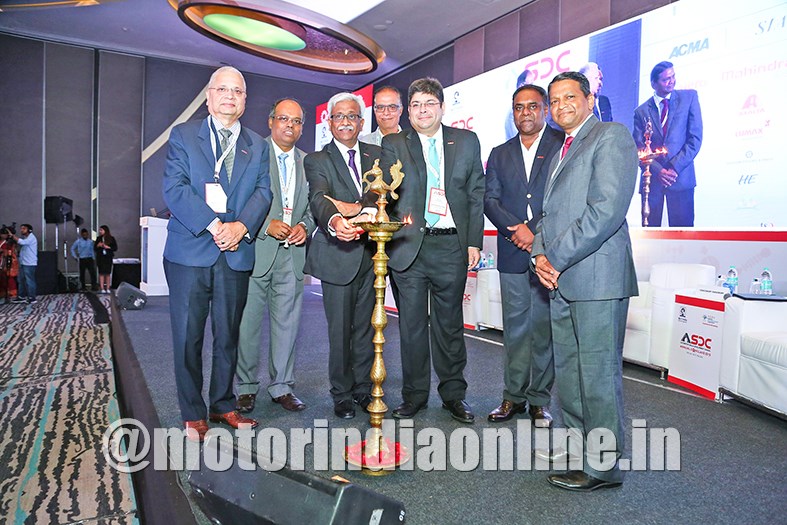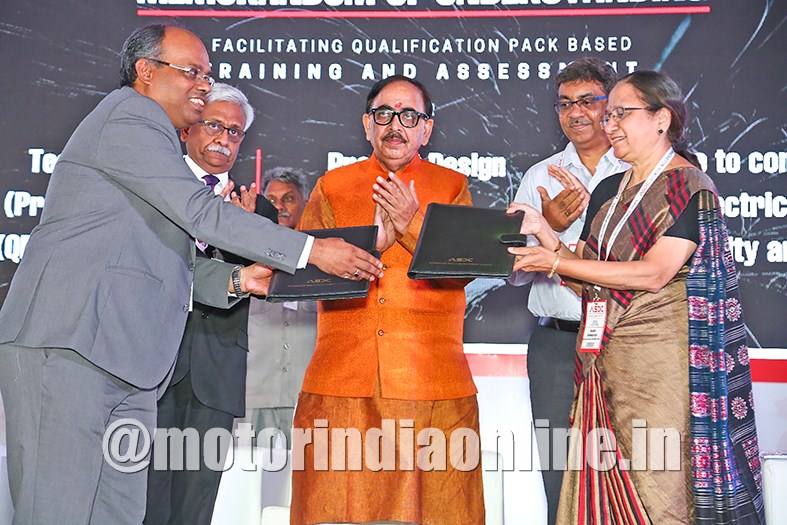The Automotive Skills Development Council (ASDC), the first Sector Skill Council of India, organised the ASDC Annual Conclave 2019 in New Delhi on July 24. The conclave focused on bringing industry experts on-board to provide key insights for building a skilling ecosystem by partnering with the industry and making skills aspirational. The program consisted of knowledge sharing panel discussions to provide credible and quality training opportunities in the automotive sector.

The day-long event focused on various panel discussions on industry expectations from the skilling ecosystem, vocational skills institutions and industry training centres’ perspective on challenges and opportunities associated with skilling, and thirdly, the role of the state to mobilize and make skills aspirational in the automotive skilling ecosystem.
In the special keynote sessions by the Chief Guest on the occasion, Dr. Mahendra Nath Pandey, Minister for Skill Development & Entrepreneurship, Government of India, and Mr. Nikunj Sanghi, Chairman, ASDC, they welcomed the guests and updated the gathering on the progress made by ASDC.
Then the Skill Gap Study Report was launched by Dr. Pandey, which highlighted the skill gap which persists in the automotive industry at various levels. The TCS portal was also launched, which is a step in the direction of digitising the automotive skill learning and assessment processes to provide wider access. The portal will help to enable outcome based skilling, provide job listings, affiliation management and standardised learning delivery through the Automotive Skill Hub.
The first panel discussion elucidated on the expectations of automotive industry to get the desired skilled manpower and the current challenges around it, which include aspirational, location and quality gaps. The panel comprised of various automotive associations like SIAM, ACMA and FADA.
In the second panel discussion, representatives from the industry and vocational skills institutions presented their viewpoints on the challenges and opportunities associated with the automotive industry. Members of the panel were from the Automotive Research Association of India, Hella India Lighting Ltd., Mahindra Rise, NTTF and Mangalam University.
The third and final panel discussion was attended by secretaries and joint secretaries of various State skill development missions. During the dialogue, limelight was shed on the challenge of mobilization at various levels when it comes to skilling and, consecutively, suggestions were put forward for making skills training aspirational through different State initiatives.

A specially built Eicher Driver Care van, equipped with advanced equipment and skilled staff, was also deployed at the venue to provide services like vision check-up, hearing test, blood pressure, sugar test and further healthcare recommendations free of cost. Also, spectacles were made available to people who came for check-up at subsidized costs. Mr. Manish Kumar, MD and CEO, NSDC, also visited he Eicher Eye care vans and appreciated the initiative by Eicher.
The National Skill Development Corporation (NSDC) also divulged extensive industry-specific insights on how various models of apprenticeship have helped to boost skilling in the automotive sector. Various successful case studies on best skilling practices featuring Hero MotoCorp Ltd., Sandhar Technologies Ltd., Popular Vehicles & Services Private Ltd., and Nambirajan Foundation were discussed in detail.
Supporting this objective, Dr. Mahendra Nath Pandey said: “The automotive industry contributes 7.5% to the overall GDP of the country and through its contribution it is certain to give a boost to the Prime Minister’s vision of making India a $5 trillion-dollar economy. In order to achieve this, it is essential that we train our workforce on the latest technologies and make them future ready, using best-in-class infrastructure. I urge the automotive industry to focus on an effective outreach program and mobilize the youth in India for skilling, re-skilling and up-skilling programs in collaboration with the Skill India mission.”
Mr. Rajan Wadhera, President, SIAM, said: “To boost skilling in the automotive sector, there needs to be a consolidated effort from industry leaders in providing training to personnel at various levels. At the same time, impetus by the Government is of vital importance to build an aspirational automotive skilling ecosystem. Such initiatives help to mobilise various stakeholders and provide a common platform wherein by sharing key insights we can deliberate and find solutions for various issues being faced in skilling the workforce.”
Mr. Manish Kumar, Managing Director & CEO, National Skill Development Corporation (NSDC), said: “Making skilling aspirational is an essential task undertaken by NSDC, and to promote it in the automotive sector, ASDC is working diligently to skill and up-skill the nation’s workforce. The key insights derived basis various industry specific case studies have been critical in highlighting the effectiveness of boosting skilling at multiple levels with the help of apprenticeship.”
Mr. Nikunj Sanghi, Chairman, ASDC, commented: “My sincere thanks to everyone for coming together to participate in this discussion. It is imperative to build a conversation around the necessity of automotive skill learning by imparting special training, successful mentorship opportunities and refining the process for easy accessibility. This program is a step in the direction of integrating the perspectives of different stakeholders to create a consolidated strategy which can boost skilling in the automotive sector. We at ASDC are committed to becoming a benchmark in the ecosystem which the Government is trying to create in skilling India.”
After sharing a few insights on best skilling practices, an award ceremony was held wherein the winners of ‘India Skills’, a biennial competition organised by NSDC under the Ministry of Skill Development & Entrepreneurship (MSDE), were felicitated by Mr. Dilip Chenoy, Secretary General, FICCI, Mr. Ranjan Choudhary, Head WorldSkills India, NSDC, Mr. Vikrant Mohan, National President, All India Automobile Workshops Association Founder, and Mr. P.K. Kapse, former MD, Eicher Motors.
Mr. Arindam Lahiri, CEO, ASDC, concluded the event by proposing a vote of thanks. He said: “I would like to offer my sincere thanks to ASDC and its team for facilitating this conclave as a common platform for industry leaders, automobile manufacturers and also vocational training institutes to come together and deliberate on streamlining the automotive skills ecosystem in India. At the same time, I would also like to thank members of industry bodies like SIAM, ACMA, FADA and NSDC, as well as the Ministry of Skill Development and Entrepreneurship (MSDE) and the Ministry of Rural Development (MoRD), industry associations like FICCI, CII, PHD Chambers, and finally ASDC’s training, assessment and knowledge partners, for providing key insights into the ground realities of skilling the automotive workforce. Last but not the least, the success of the event is also attributed to all our sponsors, vendors and support members. With the push of electric vehicles and other innovative technologies in the automobile sector, evolution of skilling and up-skilling is the need of the hour.”